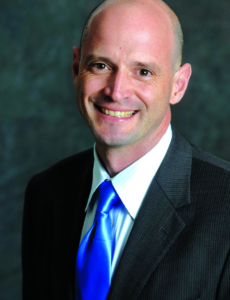SHAH IS FIRST RECIPIENT OF GILLIAM CHAIR IN SOCIAL JUSTICE
When the Luskin School formally presented its fifth and newest endowed chair to Professor Manisha Shah in November, former Dean Frank Gilliam and benefactors Meyer and Renee Luskin were in attendance.
The Franklin D. Gilliam, Jr. Chair in Social Justice, which was created by the Luskins as part of their naming gift to the School in 2011, is now fully funded. It will provide financial support for Shah’s research throughout her five-year term as holder of the chair.
Gilliam, who is the chancellor of the University of North Carolina at Greensboro, said he was honored to have his name attached to an award focusing on social justice.
“Meyer and Renee have ambitious goals about how to change the world and how to make it a better place,” Gilliam said. “At the core of that commitment is social justice: What, in a democracy, are you going to do about vast inequality?”
He pointed to a statement by sociologist W.E.B. Du Bois that the so-called color line is the great American dilemma. “Whether it’s African Americans or Muslims, Latin Americans or Asian Americans, it’s about integrating all people into the society and determining the rules upon which entry to society will be considered legitimate,” Gilliam said.
Dean Gary Segura credits Gilliam with codifying social justice as a unifying theme among the disparate departments that were rolled together decades ago into one school of public affairs.
“Frank is very much the dean that put the social justice stamp on the School,” Segura said. “The Luskin School we know today came into existence as a social justice-oriented entity because of his ingenuity.”
The Luskins have also endowed three other chairs benefitting professors at UCLA Luskin, Segura noted. One provides funding to research projects under his direction as dean. Another funds the research endeavors of the director of the UCLA Luskin Institute on Inequality and Democracy, a position held by Ananya Roy since it was founded five years ago. The third supports the director of the Luskin Center for Innovation, a position held by JR DeShazo prior to his departure in August to become a dean at the University of Texas. A search for DeShazo’s permanent replacement is underway. The fifth endowed chair at UCLA Luskin is the Marjorie Crump Chair in Social Welfare, currently held by Ron Avi Astor.
Segura said all these chairs were funded with gifts of $2 million to $3 million to provide funding in support of academic research endeavors. UCLA Luskin does not currently have any endowed chairs of another type offered at UCLA in recognition of gifts at the $5 million level. Those chairs include salary support for a recipient.
Shah is a professor of public policy who joined the UCLA Luskin faculty in 2013. Her scholarship tends to focus on issues of health equity and exploitation of disadvantaged people around the world, and she is the director of Global Lab for Research in Action at
UCLA Luskin, which she founded in 2019.
So, what is it like to have one’s name attached to an endowed chair?
“As with any sort of institutionalized thing like this, the naming of a school or a professorship or a scholarship is significant because it goes on in perpetuity,” Gilliam said, smiling broadly. “If somebody has the misfortune of asking one day who Frank Gilliam was, and they go back and discover who I was and what my connection was to the Luskin School, then that story gets told again.”

Jacqueline Waggoner, left, and Lourdes Castro Ramirez will co-chair a newly created Equity, Diversity and Inclusion committee on the UCLA Luskin Board of Advisors.
FUNDING CAMPAIGN TIED TO EQUITY LAUNCHES AS BOARD WELCOMES NEW MEMBERS
The UCLA Luskin Advisory Board welcomed six new members to start the academic year: Lourdes Castro Ramirez, Andy Cohen, Brien Kelley, Travis Kiyota, Alex Rose and Wendy Wachtell. Castro Ramirez and continuing board member Jacqueline Waggoner are urban planning alumnae, and they will co-chair a newly created Equity, Diversity and Inclusion committee. The committee will focus on confronting disparities, driving equity and creating greater access in the field of public affairs. To kick off this initiative, Castro Ramirez and Waggoner created a matching gift campaign to encourage others to join them to support this cause. Funds raised during the campaign will go toward the Urban Planning Equity, Diversity & Inclusion Fund. The fund seeks to diversify the field of planning, providing two kinds of support: funded internships with nonprofit community organizations that otherwise could ill afford to provide a paid internship; and student fellowships, allowing students to devote more time to learning instead of having to hold down a job or being saddled with an unsustainable debt load. For more information, contact Nicole Payton at npayton@luskin.ucla.edu.

Research grant from W.K. Kellogg Foundation will seek to broaden the understanding of issues affecting Latinos.
KELLOGG GRANT WILL SUPPORT LATINO-FOCUSED RESEARCH DATABASES
The UCLA Latino Policy and Politics Initiative (LPPI) was awarded a $2.5 million grant from the W.K. Kellogg Foundation to support a pair of new research databases that will become available to policymakers, scholars and the public as resources for broadening understanding of issues affecting the Latino community.
“As the largest nonwhite minority group in the United States,
Latinos are integral to building a prosperous future for all Americans,” said Sonja Diaz, founding director of LPPI. “Yet Latinos face significant barriers to economic opportunity, political representation and social mobility. This funding will enable us to reliably collect data that brings Latinos and the issues that impact them out of the shadows
and to create real policy solutions that build a truly inclusive economy and democracy.”
The first of two databases, the Latino Data Hub, will contain verified data on demographics, socioeconomics and civic participation that will help decision makers promote policies that benefit Latino communities. It is intended to become a go-to resource for national, state and local data, and it will also include statistics and information on climate change and the environment, economic opportunity and social mobility, education, health and housing.
The second database, the Latino Research Redistricting Hub, will help identify how the drawing of state and federal electoral maps affects Latinos. The hub will be a resource for officials engaged in redistricting decisions with a goal of ensuring fair representation in politics and government for the nation’s diverse Latino communities.
“Before we can address inequity, we must tell the truth about our conditions, and that is what data does,” said Cicely Moore, program officer at the W.K. Kellogg Foundation. “We are proud to invest in creating tools that help us see our biggest challenges clearly and identify equitable solutions that enable us all to thrive.”
FIRST GROUP OF YAROSLAVSKY FELLOWSHIPS AWARDED
The inaugural group of graduate fellows to receive support from the Barbara Yaroslavsky Memorial Fund recently met virtually with their benefactor, Zev Yaroslavsky, to share experiences and talk about their futures.
The fellows include students working toward graduate or doctoral degrees in public policy, social welfare or public health at UCLA, or any combination thereof. Their areas of expertise and concentration include mental health as it relates to chronic disease, refugees in connection with forced migration and human rights, family services, and health and mental health across the lifespan.
Zev Yaroslavsky, whose long career in public service included time as both a county supervisor and city councilman in Los Angeles, is now on the faculty at UCLA Luskin. He established the fellowship with support from friends and family after the death of his wife in December 2018, honoring her legacy of advocacy and commitment to health care for all.
URBAN PLANNING FELLOWSHIP CIRCLE FINDS SUCCESS
The recently created Urban Planning Fellowship Circle has raised $53,350 to benefit urban planning students impacted by the pandemic, surpassing its goal of $50,000 with more donations on the way.
Led by co-chairs Joan Ling MA UP ’82 and Nicole Vermeer MA UP ’96, a group of Urban Planning alumni banded together to help the next generation of urban planners weather a challenging year.
Other committee members were Toni Bates ’82, Alice Carr ’95, Robert De Forest BA ’99, MBA ’06, MA UP ’06, Nancy Lewis ’77, Reagan Maechling ’05, Katherine Perez ’97, Michele Prichard ’89, Anson Snyder ’90, James Suhr ’87, Yasmin Tong ’92 and Dwayne Wyatt ’83. Staff support was spearheaded by Robin McCallum, department manager.
The UCLA Luskin Development team is looking to replicate this model for the other departments. Anyone interested in making a similar impact to benefit students from public policy or social welfare may contact Laura Scarano, associate director of development,
at lscarano@luskin.ucla.edu.
CENTER FOR INNOVATION FUND HONORS DESHAZO

JR DeShazo
A campaign has been created to seek gifts in honor of JR DeShazo to the student fellowship fund for environmental justice.
Former UCLA Professor DeShazo, inaugural director of the Luskin Center for Innovation, became the dean of the LBJ School of Public Affairs at the University of Texas in August. The student fellowship fund seeks to reflect the spirit of his enduring contribution and the Center for Innovation’s long record of support for hundreds of students during his tenure, helping to shape the next generation of policy.
The effort reflects the Luskin Center for Innovation’s commitment to supporting first-generation Bruins, students of color and other emerging environmental leaders via two types of fellowship opportunities:
- one providing paid opportunities for students to collaborate with community-based organizations to advance environmental justice;
- the other expanding opportunities in the center for students to conduct research that shapes environmental policy.



